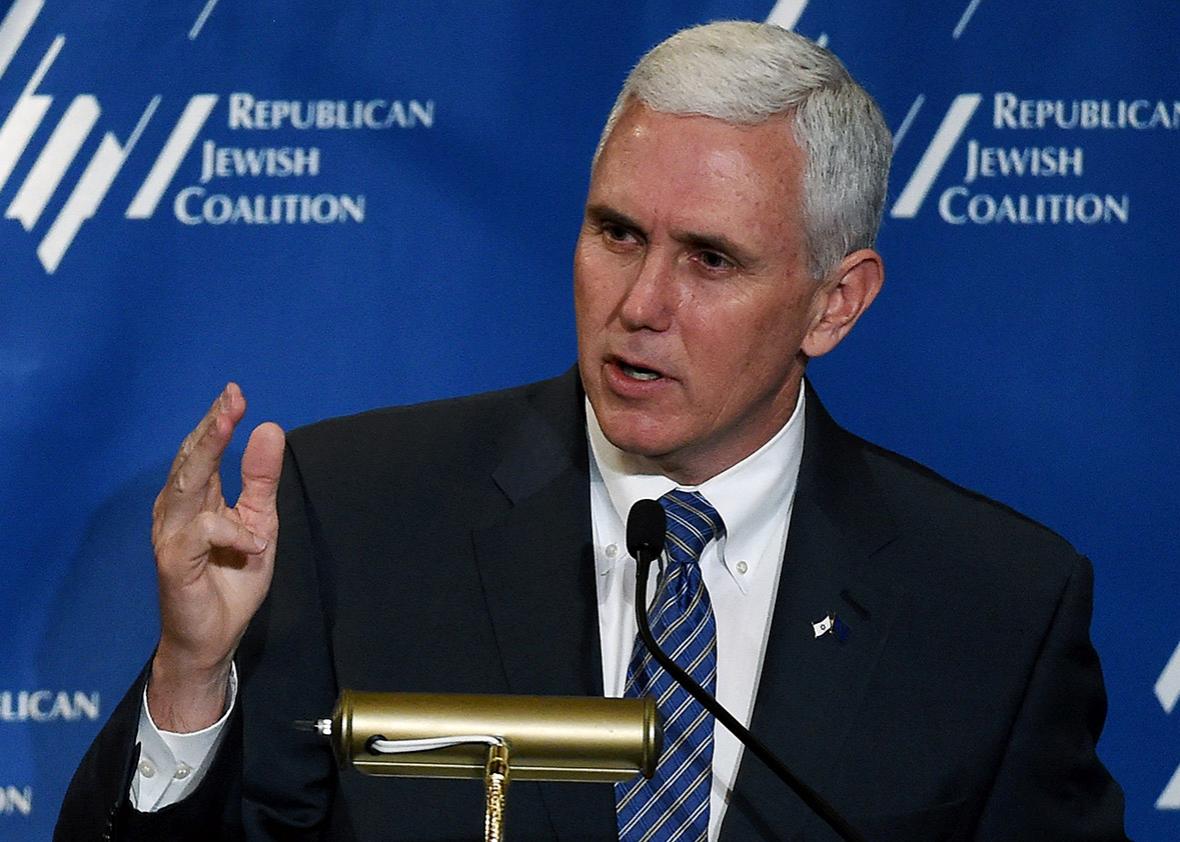There are a lot of things to say about the names on Trump’s purported vice presidential shortlist, but “has any political future whatsoever” isn’t one of them.
Newt Gingrich is the national mascot for grand ole crankery whose gigs include going on CNN and making dumb DVDs. Chris Christie is the term-limited governor of New Jersey who couldn’t make it past New Hampshire in his own presidential run and is disliked by most everyone in his state and America at large. Jefferson “Jeff” Beauregard Sessions III is an old man in the Senate who hates immigrants and has a stereotypically poor history of racial comments. Retired Gen. Michael Flynn is interesting as a dark horse, but he’s a pro-choice novice whom Trump appears to have soured on.
Which brings us to the hot candidate for at least the next 47 minutes, Indiana Gov. Mike Pence. The Washington Times reported Sunday that Trump is “likely” to select Pence as his running mate. The story quoted Republican lawyer and insider James Bopp as saying there’s a “95 percent” chance Trump picks Pence now that his campaign has scheduled a mid-week Indianapolis rally with the governor. This all leads me to believe that Pence won’t be the vice presidential pick. That’s not meant as an insult to the Washington Times’ intrepid reporting or Bopp’s rigorous statistical analysis; it’s just that presidential campaigns are sophisticated operations that intentionally throw out red herrings—like, say, scheduling a mid-week rally with a reported member of the short-list—solely to troll reporters and prolong the secret. Then again, Trump’s presidential campaign is not a sophisticated operation, and maybe he’s scheduling a rally with Pence to introduce him as his vice presidential pick.
This raises the question of what in God’s name Pence is thinking. Here is a figure conservatives have respected for a decade, who served as a leader in the House and now as a governor. He took a beating and his polling dropped following last year’s Religious Freedom Restoration Act mess, a fiasco that certainly contributed to his decision not to run for president in 2016. If he were able to grind through that to gubernatorial re-election this year, though, the table might be cleared for a run in 2020. Why interrupt that by resigning as governor and hitching his wagon to a probably doomed Trump campaign?
Conventional theories about how Republican hopefuls should prep themselves for 2020 in anticipation of a Trump walloping usually involve circumventing this year’s nominee without outright rejecting him. Sen. Marco Rubio—the ideal figure to follow if you wish to glean the prevailing conventional wisdom of GOP consultants —has given several thousand answers about his allegiance to the presidential nominee. Sen. Ted Cruz has given several thousand punts. You don’t want to embrace the joke nominee, but you don’t want to disrespect the many voters in your party who, in Cruz’s and Rubio’s cases, voted for him in greater numbers than they did for you. The safe answer, then, is to pathetically muddy the waters so as to be able to give whichever answer is popular when the next campaign rolls around.
What if we were to posit—take a breath—that perhaps the conventional wisdom among the GOP consultant class here, and elsewhere, is debatable? And that it might be worth the risk for Pence to challenge it?
National Review’s Eliana Johnson, in a piece seeking to answer why Pence would consider accepting the VP slot, reports that a future presidential run of his own is very much part of Pence’s consideration. “Several of the governor’s confidants” tell Johnson that Pence “believes a spot on the national ticket could simultaneously lift him out of a tough re-election campaign in Indiana and make him a top prospect for the Republican nomination in 2020 or 2024.” If it’s 2024 and Pence is a sitting vice president, it’s obvious enough how accepting Trump’s offer puts him in line to be the next Republican presidential nominee. But in the more likely case that Trump-Pence goes down in flames? What edge would that give Pence in 2020?
The loyalty card.
The Republican base will not like the presidency of Hillary Clinton if it comes to pass. I know, I know. They will describe her as even worse than President Obama, the previous worst person in history, whether they believe that or not. Republican voters who didn’t particularly love Donald Trump but supported him anyway in an effort to stop Clinton will say to those who kept their distance from Trump: See what you left us with?
Here’s where Pence would have a unique advantage over Cruz, Rubio, or any other 2020 prospect who didn’t give everything they had to elect Donald Trump. Any time during the 2020 campaign that they mention something terrible Clinton has done—which will be just about every other word—Pence can jump in and say: Yeah, and what did you do to prevent this? I quit my job to stop Hillary Clinton from getting elected president, while you just looked out for yourself.
If Pence eventually does want to be president, accepting Trump’s VP offer if it comes might be his best play. It would give him a bond to loyal Republican voters and a boost to his national stature. If he didn’t take it and Trump lost, he’d enter 2020 as a once-promising House member turned socially conservative governor hustling for national name recognition. Ask Bobby Jindal how far that gets you.
